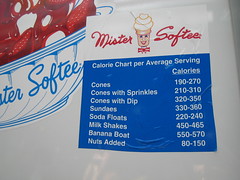More on Nutrition Data on Indiana Menus:
 Image by ShellyS via Flickr
Image by ShellyS via Flickr
"It's not the providing of information that restaurants have a problem with – many chains provide the information now. The issues are:
Cost: While everyone is thinking "chain," it is really brand that the bill covers. As you know, with any brand there is a franchisor and franchisees. While the franchisor may pay for nutritional analysis (but probably share that cost with the franchisees), a local small business owner who is a franchisee may own only one location in Indiana. He would be responsible for paying for all the other expenses such as printing menus, menu boards, drive-thrus, etc. Grocery delis, convenience stores and hotels are covered as well as local Indiana chains including MCL, Arni's, Pizza King, Sunshine Cafes.
Liability: Humans making the food. Items can be substituted by distributors. There is lots of room for error and no protection against frivolous lawsuits.
Inconsistency: While a chain may have paid for the requirements in New York, when Indiana or any other jurisdiction adds their spin, then there are more costs in analysis, more costs in changing menus.

![Reblog this post [with Zemanta]](http://img.zemanta.com/reblog_e.png?x-id=e89eed88-833d-4982-9682-642870997259)

3 comments:
It seems there are ways for private restaurants to post nutrition info. cheaply and efficiently. They only have to post on one menu if they are a fast-food chain and on their menus if they are a dine-in restaurant. Restaurants are constantly changing and printing new menus anyway so it shouldn't be too big of a burden. Plus, they can post info. on their website which costs nothing.
The point is, Indiana ranks 4th in the nation for obesity and this change is long overdue.
With all due respect to Ms. Scott, her arguments are pretty weak on their face.
First of all, what frivolous lawsuits is she expecting? Is she afraid that someone will sue because their omelette was in fact 500 calories, and not 450? And, if they are in fact frivolous, they'll be thrown out of court quickly and efficiently. The entire "think of all the lawsuits" argument when something is proposed is a cliche - and a poor one at that.
Second, her argument (if you want to call it that) about local franchisers owning one restaurant explains what costs they might outlay for, but doesn't quite explain why such costs would be prohibitively expensive. As she says - most if not all of local franchiser costs are split among the franchisees. She doesn't explain how this will be any different under the new law. And forgive me, but a new sign or two isn't going to cost an arm or a leg. The local fast food franchises that currently have such signage have done so in a manner that couldn't have cost more than $50 a sign.
Third, if MCL has 20 locations in Indiana, it is not a small business. Similarly, if Arni's has 20 locations, it is not a small business (by their website's location count, they have 18). Goose the Market is a small business. Elements is a small business. MCL and Arni's are not. I don't know where one can draw a definitive line in the sand where a small business becomes a medium-sized business, but come on, if you have 20 locales, you aren't small.
Fourth, if a chain has to pay for further analysis in Indiana after having paid for analysis in NY - who cares. They want to do business here - they should have to follow the laws of the state. And frankly, I don't see what kind of daunting issue this is as Deb claims.
In sum - if you have 20 locations, you are not a small business anymore. And yes, franchisees who own only one location may need to pay a few more dollars - but just as they do with everything else - the overarching brand will likely coordinate the effort as needed. Finally, fear-mongering re: lawsuits and attorneys is about as cliched and lame as it gets.
All of Deb's concerns come across as weak and lame lobbying efforts. I for one, am unconvinced.
I'm not really clear on why the Indiana Restaurant Association is opposed. As others have aptly pointed out, the cost issue isn't an issue and I can't imagine a legit lawsuit based on calorie counts. What's the real problem? It's not like we're going to suddenly realize MCL fried chicken has a lot of calories and stop going.
Post a Comment